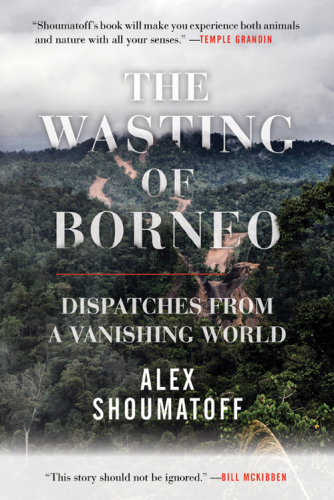
The Wasting of Borneo
Dispatches from a Vanishing World
کتاب های مرتبط
- اطلاعات
- نقد و بررسی
- دیدگاه کاربران
نقد و بررسی

February 13, 2017
Journalist Shoumatoff (Legends of the American Desert) bemoans ongoing environmental threats on the island of Borneo and warns against further loss in a cautionary tale that combines professional and personal concerns. He offers useful background on deforestation and the growth of the palm oil industry, as miles upon miles of “some of the oldest and most species-rich and spectacular rain forest on Earth” have been cleared to make room for palm plantations. India has become a major market for palm oil, substituting it for “artery-clogging ghee” in their recipes, and hundreds of products worldwide now contain palm oil, including cookies, chocolates, lipstick, and dishwashing detergent. As he shares the situation in Borneo, he also details his own lifelong interest in the environment, weaving elements of memoir into his narrative. Shoumatoff recalls his adolescence in Bedford Village, N.Y., and afternoons he spent in the woods nearby. He developed an early appreciation for the great outdoors and “a holistic, inclusive, ecological, egalitarian worldview” that would eventually inform his work for such publications as Outside and Condé Nast Traveler. Reflecting on his decades-long writing career, Shoumatoff describes environmental conflicts in Borneo and wonders what conservationists intent on saving the rainforest can do in light of increased economic demand.

February 15, 2017
An investigation of the ongoing destruction of rain forests in Borneo and the native species that live in them.In 2012, esteemed nature writer Shoumatoff (Legends of the American Desert: Sojourns in the Greater Southwest, 1997, etc.), who was a founding contributing editor to Outside and Conde Nast Traveler, traveled to Borneo to visit an orangutan to study their cognitive functions. When he arrived, he was shocked to witness the wanton destruction of the forests by "large-scale multinational logging operations," which are replacing the indigenous plants with palm trees, which produce profitable palm oil. These forests date back 130 million years, and the species of some of the flora and fauna have yet to be identified. The Wildlife Conservation Society has described the situation as "the greatest destruction of biodiversity on the planet." By the next year, the author had an assignment from Smithsonian to return to Borneo and document the situation. This book is an outgrowth of that trip. Shoumatoff recounts the recent history of the area, beginning in World War II, when efforts were made to enlist the indigenous people in the fight against Japan. In 2000, the World Wildlife Fund took the lead in the creation of conservation areas that can only selectively be logged and replaced by palm trees. Many of the forests are already in various stages of degradation, and the discovery that they cover valuable oil reserves puts the rest in jeopardy. Local politicians are under pressure to modernize by the different tribes that inhabit the region who desire the amenities of modern life. As the author shows, the indigenous population is torn between the attractions of technology and money and their own traditional, "multiperspectivist" spiritual values. A provocative, multilayered discussion of the imperative of saving our planet's environmental heritage while respecting the aspirations of indigenous people.
COPYRIGHT(2017) Kirkus Reviews, ALL RIGHTS RESERVED.

April 1, 2017
Accompanied by his childhood pal, Davie Holderness, esteemed naturalist and writer Shoumatoff embarked on an intense and probing adventure to the jungles of Borneo to bear witness to the devastation of one of the world's most diverse and vibrant rain forests. Where once-verdant foliage provided habitat for a complex ecosystem, acres of oil palm trees now stretch in every direction. Feeding an insatiable demand for everything from cookies to cosmetics, the palm oil industry has spawned an environmental scourge of epic proportions. It's going to be more like Paradise Lost than the Garden of Eden, warns Shoumatoff. Yet for all the destruction they witness, their travels bring them in contact with indigenous tribes and endangered species, committed researchers, and fellow adventurers who value the bounty and bemoan the loss of so many life forms that should be thriving on the third largest island in the world. Seasoned travel and environmental journalist Shoumatoff offers an in-depth and intimate chronicle of the threats big business imposes on the planet's fragile biodiversity.(Reprinted with permission of Booklist, copyright 2017, American Library Association.)

























دیدگاه کاربران